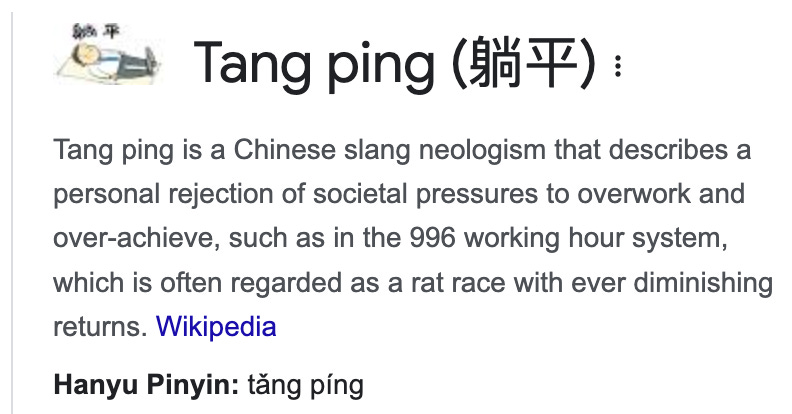Most of what we hear about China nowadays is about the country’s strategic competition with the West. Perhaps we hear about how China uses its Belt and Road Initiative to expand its influence globally or about the ways Beijing threatens its neighbors in a bid to dominate the South China Sea.
Maybe we also hear about the plethora of human rights abuses the Chinese Communist Party is committing both inside and outside of the country, like concentration camps for the Muslim Uighur population or covert police stations to detain or spy on expats and dissidents abroad. Sometimes, we wonder about China’s relationship with Russia and to what extent Beijing supports Moscow’s invasion of Ukraine.
Lately, we’ve been hearing more about how China is struggling economically.
And now, with elections taking place in Taiwan this weekend, we also hear about how Beijing may or may not respond to the election outcome. Will China invade now that the Democratic Progressive Party candidate won in Saturday’s polls? Or will the country’s leadership be content to pressure, threaten, and interfere with the outcome? That will be the subject of a classified Senate briefing next week.
All of these issues are important and worth paying attention to. But I hope I can show a little sliver of China in today’s newsletter that’s unrelated to all of these big geopolitical questions.
For example, did you know there are foreigners – many from countries participating in the Belt and Road Initiative – working as professional live streamers in Shanghai, making money from some modern type of international infomercial? Or that China’s digital nomads are moving to the southwestern city of Dali? Or that samizdat journals, guerilla media posts, and underground films are documenting alternative histories of China? If not, read the book Sparks: China's Underground Historians and their Battle for the Future.
Some of you know how much I love a good memoir, especially one with a travel story. Susan Jane Gilman’s book about backpacking through China in the 1980s, shortly after the country opened to foreigners, is one of the funniest and most mind-boggling stories I’ve read in recent years. There will be more book recommendations in the section below.
This week is about China.
Welcome to the 195 series, where I take you on a mini-tour of every country (and maybe some places that want to be countries). Each week I'll feature a new location. Some you may have heard of, while others may be new to you. The point is to learn and nurture our curiosity about the wider world. Maybe you'll find a new artist you like, too. You can skip to the bottom if you only want the week's news.
Country Info:
Population: Roughly 1.4 billion.
Current government: The Chinese Communist Party is the biggest political party in the world, with roughly 90 million members, and dominates every aspect of Chinese political life and the country’s military.
The CCP has maintained its monopoly on power ever since Mao Zedong defeated the nationalists (who subsequently fled to Taiwan) using guerilla warfare and founded the People’s Republic of China in 1949.
Language: Mandarin is China’s official dialect, spoken by more than 70 percent of the population. But other major dialects exist, including Cantonese, Huanese, and Min. Some people also speak minority languages like Mongolian, Tibetan, Uyghur, and Zhuang.
I really enjoyed this video about different regional accents in Mandarin and Cantonese.
For more on how Mandarin became the national language, I recommend Jung Tsu’s Kingdom of Characters: The Language Revolution That Made China Modern.
Religion: The Chinese Communist Party is officially atheist, like many communist parties before them, and around 50 percent of China’s population identifies as atheists. The Pew Research Center says that only 1 in 10 people in China identify with a religion.
The government does recognize five official religions, however. These are Buddhism, Taoism, Islam, Protestantism, and Catholicism. Chinese folk religions blend Buddhism and Daoism and often worship ancestors or local deities.
Standout artist: Liu Xiaodong, a painter of China’s modern life.
Standout film: Still Life, Chinese director Jia Zhang-ke’s movie about societal change.
A surprising thing: China loosened some of the requirements for U.S. citizens to obtain tourist visas this year. State-run media outlet Xinhua also reported that Beijing’s Civil Aviation Administration will increase the number of direct flights between the U.S. and China.
Story of the week: The Wall Street Journal has a photo essay about how China’s youth are “quitting the rat race” to “let it rot.” It claims that young people are becoming more rebellious and questioning traditional expectations around career and family. Some are quitting their jobs and turning to meditation, spirituality, and fortune tellers.
Honestly, that sounds a lot like young people everywhere.
What I’m writing:
• The Biden administration plans to reform the Foreign Agents Registration Act, likely before the 2024 election, when foreign interference will be a hot-button issue. I dig into the plans to overhaul FARA. This story is unlocked and free to read.
My weekly news blurbs:
What I’m reading:
• U.S. President Biden directed U.S. military forces, with the support of five other countries, to carry out military strikes against targets in Yemen controlled by the Iran-backed Houthi group, the New York Times reports.
• The U.S.-led airstrikes in Yemen killed five people and injured six, the Iran-backed Houthis said. The Associated Press has the story.
• Ukraine’s parliament refused to consider a conscription bill proposing a crackdown on draft dodgers, with MPs arguing punitive measures such as limiting their rights to own property and freely use personal money were unconstitutional, the BBC reports. The move deals a blow to Kyiv as it continues to face soldier shortages on the battlefield.
• Ukrainian President Volodymyr Zelenskyy ruled out a ceasefire with Russia, saying it would allow Moscow to rearm and regroup, the Associated Press reports.
• Azerbaijan's president doubled down on his country's right to sovereignty over a handful of territories that belonged to Soviet Azerbaijani but have been under Armenian control for more than 30 years, EurasiaNet reports.
• Two U.S. fighter jets flew over Bosnia in a demonstration of U.S. support for the Balkan country’s integrity in the face of “anti-Dayton and secessionist activity.” The pro-Russian Bosnian-Serb leader, Milorad Dodik, has repeatedly threatened to split the Serb-run half of the country, Republika Srpska, from the rest of Bosnia. ABC News has the story.
• In the Serb-run part of Bosnia, Serb nationalist and pro-Moscow groups from Bosnia, Serbia, and Russia celebrated the controversial Day of Republika Srpska with fireworks, militaristic warnings, and slogans glorifying war criminals, Balkan Insight reports.
• The United States warned that ongoing celebrations of the Bosnian Serb self-proclaimed national holiday — which included a parade of paramilitary and police troops — were in violation of Bosnia’s constitution and a 1995 peace agreement and amounted to a criminal offense, the Associated Press reports.
• Polish police arrested the former interior minister and the deputy interior minister inside the presidential palace in Warsaw, highlighting the political turmoil between the Law and Justice party (PiS) and the new pro-EU coalition, the BBC reports.
• The police entered Poland’s presidential palace and took the two former ministers into custody. They had been hiding under the protection of President Andrzej Duda after being sentenced to prison terms for abuse of power, Politico Europe reports. The arrests cut to the heart of a fight between Duda and new Prime Minister Donald Tusk, who is seeking to unravel eight years of rule by the nationalist, conservative Law and Justice Party (PiS).
• Tens of thousands of opposition supporters protested outside Poland’s parliament against the new government’s imprisonment of two former ministers convicted of abuse of power, Reuters reports.
• Opposition politicians in Italy called for the government, headed by far-right Prime Minister Giorgia Meloni, to explain how hundreds of demonstrators were able to give a banned fascist salute at a Rome rally without any police intervention, the Associated Press reports.
• Cyprus is demanding that parts of Syria be designated safe enough to return prospective Syrian asylum seekers, EU Observer reports.
• European Council president Charles Michel announced he would step down from his role early so he could run for the European Parliament, France 24 reports.
• The president of the European Council, Charles Michel, announced he will run as a candidate in the European parliamentary election in June, Politico Europe reports. Without a permanent Council chief, Hungarian PM Viktor Orbán, whose country takes over the rotating presidency of the Council of the EU in July, would lead the meetings instead.
• South Africa presented its case accusing Israel of genocide at the International Court of Justice, saying Israel’s plan to “destroy” Gaza comes from the “highest level of the state,” the BBC reports.
• The Israel Defense Forces said it “completed the dismantling of Hamas’ military framework” in the northern Gaza Strip, ABC News reports. The IDF spokesperson added that while there may be Hamas members operating in the region, “they now operate without a framework and without commanders.”
• Israel vowed to use different tactics in central and southern Gaza based on lessons “learned from the fighting so far,” the New York Times reports.
• In a rebuke against right-wing ministers of his own coalition government, Israeli Prime Minister Benjamin Netanyahu said, “I want to make a few points absolutely clear: Israel has no intention of permanently occupying Gaza or displacing its civilian population.”
• The Palestine Red Crescent said an Israeli drone missile hit an ambulance in Gaza, killing four crew members and the two patients it was transporting, the New York Times reports.
• Violence, including the sexual crimes committed by Hamas during the Oct. 7 attacks, “constitute gross violations of international law, amounting to war crimes,” and may also be crimes against humanity, two United Nations experts said. The UN special representative on sexual violence in conflict accepted Israel’s invitation to investigate allegations of sex crimes committed by Hamas on Oct. 7.
• A new U.S. intelligence assessment found that it would be difficult for Israel to succeed in a war against the Hezbollah group in Lebanon due to the war in Gaza, the Washington Post reports.
• Israel is conducting more frequent strikes on Iran-linked targets in Syria, including infrastructure, air defense systems, and people involved in arms transfers to Iran’s proxies in the region, Reuters reports.
• The future of the counter-ISIS mission in Iraq may be crumbling as the U.S. responds to Iranian proxy attacks in the region, the Daily Beast reports.
• Iraq wants a quick and orderly negotiated exit of U.S. military forces from its territory under a “process of understanding and dialogue,” Prime Minister Mohammed Shia al-Sudani said, describing their presence as destabilizing amid regional spillover from the war in Gaza. Reuters has the story.
• Chinese President Xi Jinping elevated diplomatic ties with a record number of 17 countries and territories last year, most of them from the developing world, as China seeks to rally the Global South to reshape the U.S.-led world order. Bloomberg has an analysis of statements issued by the foreign ministry.
• Myanmar’s military reached a ceasefire agreement with a coalition of ethnic minority guerrilla groups it has been fighting in the north, the Associated Press reports.
• Ecuador’s president ordered that criminal gangs be “neutralized” after masked gunmen stormed a live television studio in Ecuador yesterday, forcing employees to the floor, the BBC reports.
• The Pakistani Taliban claimed responsibility for a roadside bomb that killed six police officers guarding an anti-polio immunization campaign in northwestern Pakistan, ABC News reports. Anti-polio campaigns in Pakistan are often targeted by Islamic militants, who falsely claim that vaccination programs are a Western conspiracy to sterilize children.
• Somaliland’s defense minister said, “Ethiopia remains our number one enemy” and resigned in protest over his government signing an agreement permitting landlocked Ethiopia access to Somalia’s coastline, the Associated Press reports.
• A United Nations helicopter carrying nine passengers was captured in Somalia by the Al Shabab militant group after making an emergency landing due to technical difficulties, the New York Times reports. Six of the passengers were captured, two escaped, and one was killed. Al Shabab has long promised to topple the UN-backed national government in Somalia and establish an Islamic state.
• Sudan’s civil war threatens the lives of almost three million children, the United Nations Children’s Fund (UNICEF) warned as fighting spread to Jazeera state, the country’s breadbasket, where half of the population of 5.9 million people are children. NBC News has the story.
• The discovery of a secret tunnel in a historic Brooklyn synagogue led to a brawl between Hasidic Jewish worshippers and police, the Associated Press reports. The synagogue remains closed off by police barricades as building safety agents investigate whether the tunnel, dug without official permission, caused structural damage to the revered Jewish property.
You can write to me for any reason: c.maza@protonmail.com










